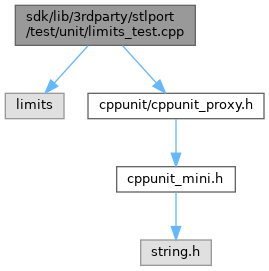
Go to the source code of this file.
Classes | |
| class | LimitTest |
| class | ArbitraryType |
Macros | |
| #define | CHECK_COND(X) if (!check_cond(X)) { CPPUNIT_MESSAGE(#X); return false; } |
Functions | |
| CPPUNIT_TEST_SUITE_REGISTRATION (LimitTest) | |
| bool | check_cond (const bool &cond) |
| bool | valid_sign_info (bool, bool) |
| template<class _Tp > | |
| bool | valid_sign_info (bool limit_is_signed, const _Tp &) |
| template<class _Tp > | |
| bool | test_integral_limits_base (const _Tp &, bool unknown_sign=true, bool is_signed=true) |
| template<class _Tp > | |
| bool | test_integral_limits (const _Tp &val, bool unknown_sign=true, bool is_signed=true) |
| template<class _Tp > | |
| bool | test_signed_integral_limits (const _Tp &__val) |
| template<class _Tp > | |
| bool | test_unsigned_integral_limits (const _Tp &__val) |
| template<class _Tp > | |
| bool | test_float_values (_Tp lhs, _Tp rhs) |
| template<class _Tp > | |
| bool | test_float_limits (const _Tp &) |
| template<class _Tp > | |
| bool | test_qnan (const _Tp &) |
Macro Definition Documentation
◆ CHECK_COND
| #define CHECK_COND | ( | X | ) | if (!check_cond(X)) { CPPUNIT_MESSAGE(#X); return false; } |
Definition at line 57 of file limits_test.cpp.
Function Documentation
◆ check_cond()
Definition at line 56 of file limits_test.cpp.
◆ CPPUNIT_TEST_SUITE_REGISTRATION()
| CPPUNIT_TEST_SUITE_REGISTRATION | ( | LimitTest | ) |
◆ test_float_limits()
Definition at line 124 of file limits_test.cpp.
Referenced by LimitTest::test().
◆ test_float_values()
Definition at line 120 of file limits_test.cpp.
Referenced by test_float_limits().
◆ test_integral_limits()
| bool test_integral_limits | ( | const _Tp & | val, |
| bool | unknown_sign = true, |
||
| bool | is_signed = true |
||
| ) |
Definition at line 88 of file limits_test.cpp.
Referenced by LimitTest::test(), test_signed_integral_limits(), and test_unsigned_integral_limits().
◆ test_integral_limits_base()
| bool test_integral_limits_base | ( | const _Tp & | , |
| bool | unknown_sign = true, |
||
| bool | is_signed = true |
||
| ) |
Definition at line 70 of file limits_test.cpp.
Referenced by LimitTest::test(), and test_integral_limits().
◆ test_qnan()
Definition at line 233 of file limits_test.cpp.
Referenced by LimitTest::qnan_test().
◆ test_signed_integral_limits()
Definition at line 111 of file limits_test.cpp.
Referenced by LimitTest::test().
◆ test_unsigned_integral_limits()
Definition at line 115 of file limits_test.cpp.
Referenced by LimitTest::test().
◆ valid_sign_info() [1/2]
Definition at line 64 of file limits_test.cpp.
◆ valid_sign_info() [2/2]
Definition at line 60 of file limits_test.cpp.
Referenced by test_integral_limits_base().